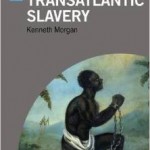 From Amazon.com: “From 1501, when the first slaves arrived in Hispaniola, until the nineteenth century, some twelve million people were abducted from west Africa and shipped across thousands of miles of ocean – the infamous Middle Passage – to work in the colonies of the New World. Perhaps two million Africans died at sea. Why was slavery so widely condoned, during most of this period, by leading lawyers, religious leaders, politicians and philosophers? How was it that the educated classes of the western world were prepared for so long to accept and promote an institution that would later ages be condemned as barbaric? Exploring these and other questions – and the slave experience on the sugar, rice, coffee and cotton plantations – Kenneth Morgan discusses the rise of a distinctively Creole culture; slave revolts, including the successful revolution in Haiti (1791-1804); and the rise of abolitionism, when the ideas of Montesquieu, Wilberforce, Quakers and others led to the slave trade’s systemic demise. At a time when the menace of human trafficking is of increasing concern worldwide, this timely book reflects on the deeper motivations of slavery as both ideology and merchant institution.”
From Amazon.com: “From 1501, when the first slaves arrived in Hispaniola, until the nineteenth century, some twelve million people were abducted from west Africa and shipped across thousands of miles of ocean – the infamous Middle Passage – to work in the colonies of the New World. Perhaps two million Africans died at sea. Why was slavery so widely condoned, during most of this period, by leading lawyers, religious leaders, politicians and philosophers? How was it that the educated classes of the western world were prepared for so long to accept and promote an institution that would later ages be condemned as barbaric? Exploring these and other questions – and the slave experience on the sugar, rice, coffee and cotton plantations – Kenneth Morgan discusses the rise of a distinctively Creole culture; slave revolts, including the successful revolution in Haiti (1791-1804); and the rise of abolitionism, when the ideas of Montesquieu, Wilberforce, Quakers and others led to the slave trade’s systemic demise. At a time when the menace of human trafficking is of increasing concern worldwide, this timely book reflects on the deeper motivations of slavery as both ideology and merchant institution.”
New Book: The Golden Leaf: How Tobacco Shaped Cuba and the Modern World by Charlotte Cosner
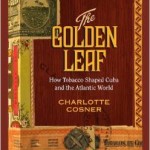
From Amazon.com: “Through the rise and fall of empires, ideologies, and economies, tobacco grown on the tiny island of Cuba has remained an enduring symbol of pleasure and extravagance. Cultivated as one of the first reliable commodities for those inhabitants who remained after conquistadors moved on in search of a mythical wellspring of gold, tobacco quickly became crucial to the support of the swelling Spanish Empire in the 17th seventeenth and 18th eighteenth centuries. Eventually, however, tobacco became one of the final stabilizing forces in the empire, and it ultimately proved more resilient than the best laid plans of kings and queens. Tobacco, and those whose livelihoods depended on it, shrugged off the Empire’s collapse and pressed on into the twentieth century as an economic force any state or political power must reckon with.”
New Book: Goodman and Lenzen, eds, Joint and Double Degree Programs: An Emerging Model for Transatlantic Exchange,
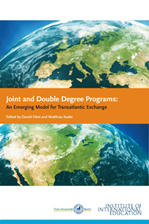 From the Transatlantic Degree Programs Project:
From the Transatlantic Degree Programs Project:
A new book released by the Freie Universität Berlin and the Institute of International Education (IIE) features practical recommendations for developing and delivering collaborative degree programs between U.S. and European universities. The publication, Joint and Double Degree Programs: An Emerging Model for Transatlantic Exchange, features articles and insights from higher education administrators and practitioners on both sides of the Atlantic.
As professional collaboration with colleagues and customers in other countries increases across sectors, colleges and universities around the world are looking to joint and double degree programs as a way to offer their students meaningful international experiences. The diverse language and cultural fluencies they obtain will help prepare them for successful careers, whether in business, government or academia.
The book seeks to provide practical recommendations on key challenges, such as communications, sustainability, curriculum design, and student recruitment. Articles are divided into six thematic sections that assess the development of collaborative degree programs from beginning to end. While the first two sections focus on the theories underpinning transatlantic degree programs and how to secure institutional support and buy-in, the third and fourth sections present perspectives on the beginning stages of a joint or double degree program and the issue of program sustainability. The last two sections focus on profiles of specific transatlantic degree programs and lessons learned from joint and double degree programs in the European context.
Read more at: http://www.jfki.fu-berlin.de/en/v/tdp/index.html
New Book: Layne Parish Craig, When Sex Changed Birth Control Politics and Literature between the World Wars
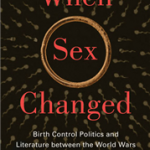 From Rutgers University Press:
From Rutgers University Press:
“In When Sex Changed, Layne Parish Craig analyzes the ways literary texts responded to the political, economic, sexual, and social values put forward by the birth control movements of the 1910s to the 1930s in the United States and Great Britain.
Discussion of contraception and related topics (including feminism, religion, and eugenics) changed the way that writers depicted women, marriage, and family life. Tracing this shift, Craig compares disparate responses to the birth control controversy, from early skepticism by mainstream feminists, reflected in Charlotte Perkins Gilman’s Herland, to concern about the movement’s race and class implications suggested in Nella Larsen’s Quicksand, to enthusiastic speculation about contraception’s political implications, as in Virginia Woolf’sThree Guineas.
While these texts emphasized birth control’s potential to transform marriage and family life and emancipate women from the “slavery” of constant childbearing, birth control advocates also used less-than-liberatory language that excluded the poor, the mentally ill, non-whites, and others. Ultimately, Craig argues, the debates that began in these early political and literary texts—texts that document both the birth control movement’s idealism and its exclusionary rhetoric—helped shape the complex legacy of family planning and women’s rights with which the United States and the United Kingdom still struggle.”
New Book: Rebecca Shumway, The Fante and the Transatlantic Slave Trade
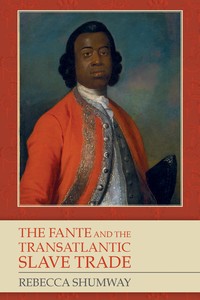
From Amazon:
The history of Ghana attracts popular interest out of proportion to its small size and marginal importance to the global economy. Ghana is the land of Kwame Nkrumah and the Pan-Africanist movement of the 19 60s; it has been a temporary home to famous African Americans like W. E. B. DuBois and Maya Angelou; and its Asante Kingdom and signature kente cloth-global symbols of African culture and pride-are well known. Ghana also attracts a continuous flow of international tourists because of two historical sites that are among the most notorious monuments of the transatlantic slave trade: Cape Coast and Elmina Castles. These looming structures are a vivid reminder of the horrific trade that gave birth to the black population of the Americas. The Fante and the Transatlantic Slave Trade/ explores the fascinating history of the transatlantic slave trade on Ghana’s coast between 1700 and 1807. Here author Rebecca Shumway brings to life the survival experiences of southern Ghanaians as they became both victims of continuous violence and successful brokers of enslaved human beings. The era of the slave trade gave birth to a new culture in this part of West Africa, just as it was giving birth to new cultures across the Americas. The Fante and the Transatlantic Slave Trade pushes Asante scholarship to the forefront of African diaspora and Atlantic World studies by showing the integral role of Fante middlemen and transatlantic trade in the development of the Asante economy prior to 1807. Rebecca Shumway is Assistant Professor of History at the University of Pittsburgh.